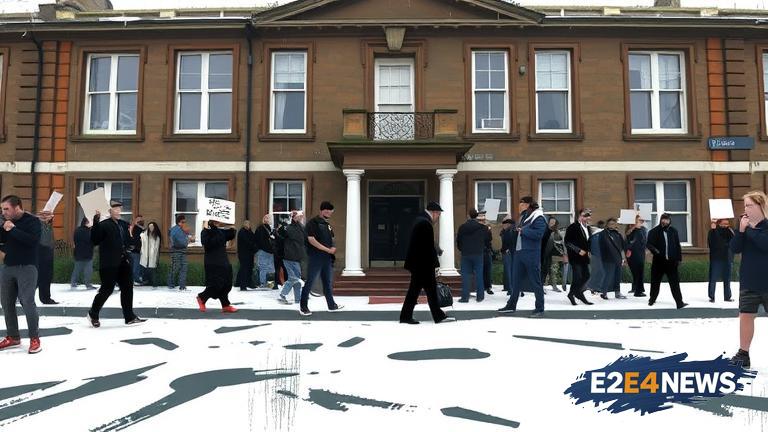The recent surge in protests against asylum hotels in Scotland has raised concerns about the potential for violence and the impact on community relations. As the Scottish government navigates the complex issue of refugee integration, it is essential to address the underlying concerns of local residents while ensuring the safety and dignity of asylum seekers. The protests, which have been marked by instances of vandalism and intimidation, have been condemned by politicians and community leaders alike. However, they also highlight the need for a more nuanced approach to refugee integration, one that takes into account the concerns of local communities while providing adequate support and resources for asylum seekers. Scotland has a long tradition of welcoming refugees and asylum seekers, but the current system has been criticized for being inadequate and inhumane. The use of hotels as temporary accommodation for asylum seekers has been particularly contentious, with many arguing that it is unsuitable and unsustainable in the long term. The Scottish government has pledged to review the current system and explore alternative solutions, but the process has been slow and fraught with challenges. Meanwhile, community leaders and activists are working to promote greater understanding and empathy between local residents and asylum seekers. This includes initiatives such as language classes, cultural events, and community outreach programs. However, more needs to be done to address the underlying concerns and fears that are driving the protests. This includes providing greater transparency and accountability in the asylum process, as well as ensuring that local communities are adequately consulted and involved in the decision-making process. The Scottish government must also do more to address the root causes of the protests, including poverty, inequality, and lack of access to resources and services. By working together and adopting a more collaborative and inclusive approach, it is possible to build a more compassionate and welcoming society for all. The protests against asylum hotels in Scotland are a symptom of a broader societal issue, one that requires a comprehensive and multifaceted response. It is essential to recognize the humanity and dignity of asylum seekers, while also addressing the legitimate concerns of local residents. This includes providing adequate support and resources for asylum seekers, as well as promoting greater understanding and empathy between different communities. The Scottish government has a critical role to play in promoting a more positive and inclusive narrative around refugee integration, one that emphasizes the benefits and contributions of asylum seekers to Scottish society. By working together, it is possible to build a more just and equitable society for all, one that values diversity and promotes human rights. The protests against asylum hotels in Scotland are a wake-up call for policymakers and community leaders, a reminder of the need for a more nuanced and compassionate approach to refugee integration. It is essential to prioritize the safety and dignity of asylum seekers, while also addressing the concerns and fears of local residents. This requires a comprehensive and multifaceted approach, one that takes into account the complex social, economic, and cultural factors that are driving the protests. By adopting a more collaborative and inclusive approach, it is possible to build a more welcoming and compassionate society for all, one that values diversity and promotes human rights. The Scottish government must take a leadership role in promoting a more positive and inclusive narrative around refugee integration, one that emphasizes the benefits and contributions of asylum seekers to Scottish society. This includes providing greater transparency and accountability in the asylum process, as well as ensuring that local communities are adequately consulted and involved in the decision-making process. The protests against asylum hotels in Scotland are a reminder of the need for a more nuanced and compassionate approach to refugee integration, one that prioritizes the safety and dignity of asylum seekers while addressing the concerns and fears of local residents. It is essential to recognize the humanity and dignity of asylum seekers, while also promoting greater understanding and empathy between different communities. By working together, it is possible to build a more just and equitable society for all, one that values diversity and promotes human rights.
